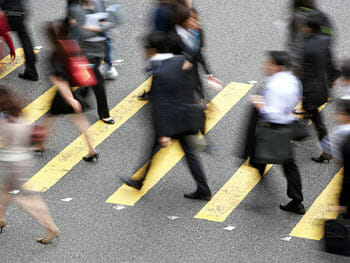
Earlier in 2017, the Maryland state legislature was considering bills that would have increased safety for bicyclists and pedestrians in our state, calling for special traffic signals where trails intersect state highways. On such roads, vehicles often travel faster than 45 mph in the areas with crossings used by both pedestrians and cyclists. One problematic area is the intersection of Veirs Mill Road and Turkey Branch Parkway in Montgomery County. Two bicyclists have been fatally struck at that intersection recently: Frank Towers, in December 2015, and Mauricio Osorio, in July 2016.
Unfortunately, all the bills died in legislative committee during March 2017. Those who advocated for the bills believe that the state of Maryland is shortchanging safety for bicyclists and pedestrians.
Bicyclists Are No Match
The use of bicycles, especially as commuter vehicles, has been growing in popularity. But it’s no contest when it comes to a crash involving a car or truck and a bicycle—those on bikes have virtually no protection. Even for cyclists wearing helmets, about three-fourths of serious injuries and deaths are due to head and brain trauma.
An increase in bicycle usage plus heavier vehicular traffic means that bicyclist fatalities have been going up—they doubled from 2014 to 2016, from five to 10 persons. About one-fifth of the 500 or so persons killed on Maryland roads each year involve bicyclists and pedestrians. It makes sense that we should do more to protect those trying to cross high-speed roads. The HAWK beacon could have helped this situation.
What Did the Bills Propose?
The bills would have enabled the installation of pedestrian-activated buttons at the crosswalks on busy roadways such as state highways. The signal system, called a HAWK beacon—also known as a High-intensity Activated crossWalK beacon—allows pedestrians and cyclists to stop traffic so they can cross safely. The bills would also have required drivers to yield to bicyclists and pedestrians in crosswalks, and to stop if motorists saw a pedestrian or bicyclist standing on a median, curb, or sidewalk at a state highway, such as Veirs Mill Road or Rockville Pike.
HAWK beacons are highly effective. A Federal Highway Administration study concluded that installing a HAWK signal reduced pedestrian-vehicular crashes at that location by 69 percent. Additionally, drivers are more likely to stop for a HAWK beacon than for flashing yellow beacons or a signalized crossing.
Why Did the Bills Fail?
According to a statement from the Maryland State Highway Administration (SHA), the agency asked legislators to vote down the proposal that would have required drivers to stop, because the SHA believed it would “pose a substantial safety risk.” The SHA insisted that drivers “would be required to interpret the intent of any stationary bicyclists or pedestrian that is near a crosswalk, curb, median divider, or other place of safety.”
However, Greg Billing of the Washington Area Bicyclist Association thinks “that drivers are smarter than that. They can understand when someone is about to enter the crosswalk versus checking their email on the sidewalk.” Billing added, “State Highway came down on convenience over safety.”
For now, if you are a pedestrian or bicyclist who regularly crosses state highways, we urge you to be exceedingly careful. And, if you feel strongly about your safety, you might consider approaching your state representative about the matter.
We’re listening. How can we help you?
At the Law Offices of Steven H. Heisler, we have devoted our practice to defending the rights of personal injury victims. We know how traumatic a serious accident can be for both the injured person and for his or her family. If you or a loved one was seriously injured, whether in a vehicle, as a bicyclist, or as a pedestrian, you may be entitled to various kinds of financial compensation, such as medical bills, lost wages, and pain and suffering. Keep in mind, however, that there is a statute of limitations – or a time limit – for filing personal injury claims. If you have been injured in an accident, you should not delay. Contact an experienced Baltimore bicycle accident attorney for a free initial consultation by calling (410) 625-4878, or use our online form.
